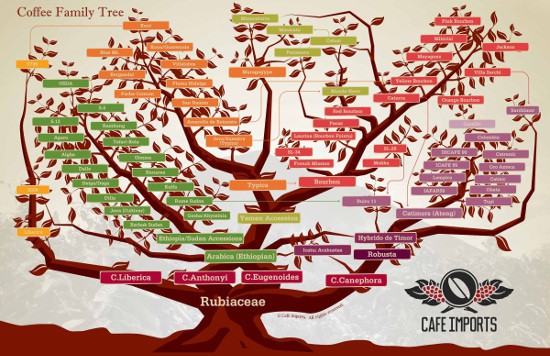A coffee varietal (or variety) is a fancy way of saying "type" of coffee. Just like there are different "types" of apple plants (granny smith, royal gala, macintosh) and "types" of tomato plants (roma, plum tomato, cherry tomato, beefsteak tomato), there are "types" of coffee plants.
Nerdy definition: A botanical term describing forms and selections of coffee plant varieties that are derived either through natural selection or through selective breeding (for specific genetic traits) resulting in distinct genetic subspecies of the main coffee species (e.g., Arabica, Canephora, Excelsa and Liberica).
CafeImports has a very detailed breakdown of the coffee family tree:
Primary varietals
The major Coffea Arabica varietals include:
- Arabica
- Robusta (Canephora)
- Liberica
- Excelsa
These can be further broken down into:
Amarello, Arabusta (interspecific hybrid), Arusha, Bergendal, Blue Mountain, Bourbon, Catimor, Caturra, Catuai, Charrieriana, Colombian, Ethiopian Harrar, Ethiopian Sidamo, Ethiopian Yirgacheffe, French Mission Bourbon, Hawaiian Kona, Java, K7, Kent, Maragogype, Marigojipe, Mayaguez, Mocha, Mundo Novo (hybrid), Pacamara (hybrid), Pacas, Pache Comum, Pache Colis (hybrid), Panama, Ruiri 11 (dwarf hybrid), San Ramon, Santos, Sarchimor, Sidikalang, SL28, SL34, Sumatra Mandheling, Sumatra Lintong, Sulawesi Toraja Kalossi, Timor (interspecific hybrid), Typica, and Uganda.
Icatu hybrids are created through repeated backcrossing of hybrids of Coffea arabica and Coffea canephora var. robusta with the coffee plant cultivars Caturra (Coffea arabica var. caturra) and Mundo Novo (Coffea arabica var. mundo novo). Also see Varietal Distinction; Selective Breeding.
Terms
In popular use many of the following terms are used somewhat interchangeably:
- varietal
- variety
- strain
- cultivar
- cultigen
- botanical origin
- hybrid
Hybrid is distinct in that it refers to a cross between two genetically dissimilar cultivars. Hybrids are typically made to influence taste and/or disease resistance.
Determining varietal
One test of whether a particular plant is indeed a cultivar/varietal is if the plant variety can be reliably propagated.
Characteristics
Different varieties (cultivars; varietals; hybrids) have distinct flavors, body (mouthfeel), and other basic coffee characteristics (e.g., acidity, bitterness/sweetness, and finish/aftertaste) as well as differing amounts of caffeine.
Regions
Distinct variations in cultivars likely reflect the particular region where the coffee was grown, including its soil, climate, and other regional factors (e.g. average amount of sunlight; altitude, etc.), and also how the coffee was harvested and processed. This can produce distinctive characteristics (e.g., the winey acidity of a Kenyan coffee, the full-bodied resonance of a Sumatra Coffee.
A consumer purchasing a coffee varietal will expect a single-origin coffee, pure and unblended, and typically labeled with the name of the country or growing region of origin, and possibly also the particular estate where the coffee was grown.
e.g., Jamaica Blue Mountain: Jamaica is the country, and the Blue Mountains are the geographical location; Blue Mountain is also the name of the coffee plant varietal (Coffea arabica var. blue mountain)
Original varietals
The first Coffea arabica varietals are thought to be Coffea arabica var. arabica and Coffea Arabica var. bourbon. Bourbon is named after the region where it was first cultivated.
Virtually all other varietals are thought to have originated from these two varietals, including the popular Arabica variety called Typica (Coffea arabica var. typica), which is derived from Coffea arabica var. arabica.
Development
Many varietals are chosen for cultivation based not necessarily on their flavor or aromatic qualities, but more so for their resistance to diseases and the ease with which they may be grown.
These new varietals are known as "cultivars" - coffee strains that are specifically developed instead of naturally derived.
More
More great coffee information can be found in All About Coffee which covers all aspects of coffee from soil to sip.
This includes coffee plants and coffee cherry, and full descriptions of all of the world's top gourmet coffee beans including Organic Coffee, Fair Trade Coffee, Bird Friendly Coffee, Strictly High Grown and Shade-Grown Coffee.
Buy Gourmet Coffee Beans
- ✔️ Fresh roasted to order
- ✔️ 100% high qualtiy Arabica coffee
- ✔️ Custom grind (or whole bean)
- ✔️ 1-way valve, laminate bag (for freshness)
- ✔️ Bulk discounts



chemsto fred
give me the best variety of fertilizer used in top dressing k7 coffee.